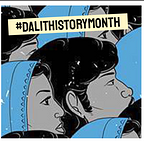Discovering new figures in Dalit Feminism- Paikabai of Chandrapur.
The story of Paikabai is re-told largely through the memories of her family members, especially from the memories of the author, Dipankar Kamble’s, grandmother, Mrunalini Khobragade. The author is presently working on a biography of his great-grandfather, Dewajibapu Khobragade’s, life and times. This includes a long chapter on Paikabai of which this piece is a short preview.
Today in #Dalithistory month, we highlight a really unique figure amongst Dalit women — Paikabai Khobragade, a Mahar woman whose determined focus on economic independence among oppressed castes’ women and paved the way for two generations of successful and important leaders of the Ambedkarite movement.
The path for Paikabai was anything but straightforward. In her days in the 1800s to the early 1900s, caste and British occupation was pronounced. She married Bhiwaji Khobragade from Dadamahal area of today’s Chandrapur but tragedy struck her family when her husband died when her Dewajibapu, her youngest son, was only two years old. The death of Bhiwaji threatened both her family’s survival but also had the potential for larger effects.
Bhiwaji had been deeply inspired by the Phules and their movement. He had influenced Paikabai and the rest of their immediate community with the principles of Satyashodak Samajist ideology. A Phuleite assertion was established and growing in their region and Bhiwaji’s sudden passing had the potential to undo the immense role he had played in helping the oppressed castes communities. But this is when Paikabai stepped in for both her family and her community.
Paikabai was completely convinced that only economic independence could put an end to the miseries of the oppressed castes. And in those days the British government offered schemes to folks who wanted to plant and deal in fruits. Paikabai took this opportunity.
Paikabai’s business consisted primarily of buying and selling fruits. She would mango and tamarind and sell them both as a wholesaler and a retailer. Whenever she found the time, she would also cultivate watermelons on the banks of the Irai River. Her goods were even transported to other states.
It would be wrong, however, to assume that she had a smooth sailing when it comes to her business. She too faced much blowback. Dominant caste people in her area were all trying to destroy her cops and sabotage her fields. But what was unique about her situation was that her entire business model was not one of individualism. It was focused on the community. She was entrenched as a member of the community. She was like a mother to everyone and everyone respected her determination and wisdom. The fruit business was also a collective effort. People guarded each other fields and shared work and profits among themselves.
Despite playing an active role in her business and community, she left no stone unturned when it came to taking care of her family too. She knew that education was extremely important for her children. She gave special attention to reading, writing and mathematics. Her dedication to her children’s’ education bore fruit too; her eldest son, Patruji, was excellent in Mathematics and a teachers’ favourite. Her youngest son, Dewajibapu, was also talented and the most loved one in the house. Hence, both his elder brothers — Patruji and Govindrao — discontinued their education to focus on helping their mother and focus on their youngest brother’s education. Dewajibapu successfully completed his matriculation before joining the rest of the family in the business. Paikabai also ensured that her fellow community members were not left behind and encouraged her sons to always be focused on a community model of business.
The legacy of Palkabai extended well beyond her life. Her three sons grew up as contemporaries to Dr. Ambedkar. In fact, Dewajibapu Khobragade went on to become the first MLA of Chandrapur-Bramhapuri Constituency. His son, Rajabhau Khobragade, went to London to become a barrister and was later even appointed as General Secretary of Schedule Caste Federation by Dr. Ambedkar. Between 1969 and 1972, Rajabhau also worked as the Deputy Chairman of Rajya Sabha. By fighting for economic independence, Palkabai ensured that her family never fell on hard times again and instead, took great strides towards ensuring equal opportunities for more members of her community.
Her family, even five to six generations on, remember her fondly They sit around and talk about how Paikabai’s favourite dish was of lamb rotya, a kind of long chapatti common in Bahujan communities and how in the summer, Paikabai used to distribute mugs of mango juice and lamb rotya to the people of her wada.
References
- The story of Paikabai is re-told largely through the memories of her family members, especially from the memories of the author, Dipankar Kamble’s, grandmother, Mrunalini Khobragade.
- Maharasthrache Shilpkar Barrister Rajabhau Khobragade — V.D Meshram
- Vidarbhatil Dalit Chalwalicha Itihas — H.L Kosare
- Babasahebanche Nishthavan sahakari, Dewajibapu Khobragade — P.T Ramteke
